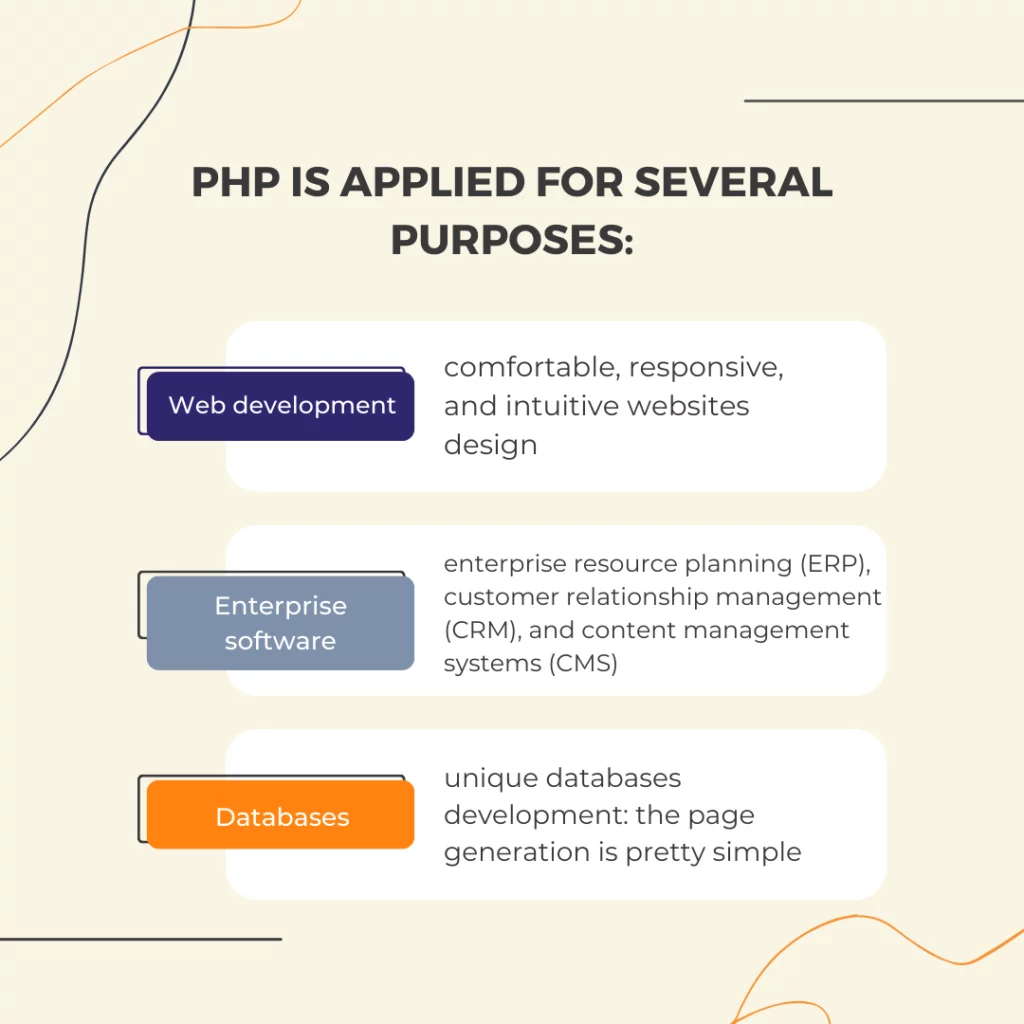Best PHP Frameworks


The PHP programming language is beginner-friendly, as juniors can easily find code examples online and solve possible problems correspondingly. In addition, this programming language is characterised by a non-corporate application sphere. Its versatility distinguishes PHP in several areas:

PHP was primarily created for web pages, so it is suitable for designing comfortable, responsive, and intuitive websites. These features allowed PHP to be widely used for e-commerce platforms. PHP is easy to integrate with HTML and various databases. PHP scripts run on the server, enabling developers to create HTML pages dynamically.
PHP’s easy integration and flexibility, as well as payment options specifically applicable for enterprise resource planning (ERP), customer relationship management (CRM), and content management systems (CMS). PHP is also suitable for creating the enterprise systems’ backend versions on mobile: the Laravel and Symfony frameworks are efficient for these purposes.
Basic knowledge of PHP makes creating a database easy. This programming language supports MS Access, Oracle and MySQL and can be utilised to develop unique databases – the page generation is simple. In addition, PHP enables programmers to use particular extensions, optimising the process.
However, it is also worthwhile to apply frameworks if you want to save time and resources. We will touch upon this question and rank the most popular PHP frameworks. But first, let us clarify the concept of a framework.
Simply put, the framework covers the software environment that is necessary for IT project creation: these can be ERP systems for a specific enterprise, CRM systems for working with clients, online stores, enterprise websites, marketplaces, etc. Developers turn to frameworks when they need to create non-standard products that are scalable and flexible.
The characteristics of frameworks have a direct impact on the following development factors:
The PHP framework contains libraries with classes, various functions, and elements for designing your future software. Thanks to frameworks, experts optimise repetitive aspects of development and prevent possible errors.
In addition, frameworks make the code clearer and more readable, which greatly simplifies the work on a single solution. To summarise, let us briefly list the main advantages of using frameworks:
One of the main advantages of Lavarel is that malicious components are automatically removed, and the security of systems is increased. This framework does not require PHP installation, web server or HHVM to obtain a virtual development and system design environment. Lavarel has a variety of functions for setting up highly complex applications – routing, password reset, data migration, authorisation, authentication, MVC architecture support and more. To speed up development even further, you can use Laravel Artisan Console, a tool that generates boilerplate code and automates routine tasks. The framework is flexible: projects can be easily scaled without changing the framework.
Disadvantages of the framework:
Laravel doesn’t have an admin panel for working with content, but you can use CMS systems supported by the framework.
For which business sectors is it used?
Among the most common examples are retail, fashion, search engines for cafes and restaurants, tourism, and construction.
The choice of PHP framework largely depends on the volume of projects you develop. Symfony is best suited for large enterprise-level systems, allowing for prompt project customisation. The database engines’ independence and adherence to the most effective web practices characterise the framework’s core.
Disadvantages of the framework:
Symfony can be relatively difficult to learn, especially when it comes to security mechanisms. Small mistakes can put your data protection at risk.
For which business sectors is it used?
The framework is actively used by retail companies and publishing houses. It is also popular among owners of platforms for searching publicly available information about people.
Yii is the fastest or easiest-to-use PHP, which is helpful for any web system creation. The framework’s documentation is also quite easy to understand. Yii has high-quality caching support, a huge user community, and efficient code-generation tools. In addition, this framework is quite extensible, leaving room for customising specific code parts.
Disadvantages of the framework:
The developer community using Yii is not as wide as other PHP framework communities. Consequently, it is more difficult to find answers to questions. Even minor errors in the code can lead to difficulties in the operation of the entire system.
For which business sectors is it used?
The framework is often used by non-profit organisations, the event industry, and crowdfunding platforms.
This framework solves specific development problems using various components. CodeIgniter is recommended for beginners who want to develop highly scalable web applications, as the framework is effortless to learn. There shouldn’t be any particular difficulties in learning the basics of working with CodeIgniter: the framework has excellent documentation.
Disadvantages of the framework:
CodeIgniter’s updates are rarely delivered, which makes it difficult to work with systems that require the highest level of security.
For which business sectors is it used?
The framework is popular among digital market organisations and software development agencies.
With Zend, developers can focus only on those features and components needed for a specific project. These elements can be loaded as separate libraries, ignoring anything unnecessary. This is why Zend is often called a nexus tool. You can integrate with external libraries to expand your system’s functionality. Developers value Zend, as it allows for taking advantage of the MVC architecture within an object-oriented PHP environment. In addition, the written code can be reused.
Disadvantages of the framework:
The transition from Laravel to Zend can be quite difficult, but this framework is perfect for object-oriented coding if you already have solid development experience.
For which business sectors is it used?
The framework is applied mainly in e-commerce, banking, healthcare, and entertainment.
This is a rather unusual option, considering that the framework’s source code is written in C. Yet, this framework is one of the fastest of the abovementioned options. Phalcon contains almost no files after installation. If you need specific modules or libraries, simply add them. Other beneficial features of Phalcon are low resource consumption and high performance.
Disadvantages of the framework:
Similar to Zend, with Phalcon, you will have discrepancies between the framework’s documentation and the more popular Laravel.
For which business sectors is it used?
Phalcon is used to create social networks, directories, and analytical platforms.
Framework or pure PHP? – the answer to this question depends on the specifics of the system you want to develop. However, we hope this article helped you learn key features of the most popular PHP frameworks.